Management Theories Report: A Comparative Analysis of Key Concepts
VerifiedAdded on 2021/06/15
|10
|715
|19
Report
AI Summary
This report provides a comparative analysis of classical management theories, including Frederick Taylor's scientific management, Henri Fayol's principles of management, and Max Weber's bureaucratic theory. The report examines the core principles of each theory, such as task specialization, authority, discipline, and the importance of rules and regulations. It discusses how these theories influenced organizational structure and employee motivation. The report highlights the application of these theories in the modern business world, including considerations for employee training, performance evaluation, and the impact of technology and automation. It also explores the strengths and weaknesses of each approach, offering insights into their relevance and limitations in contemporary management practices.
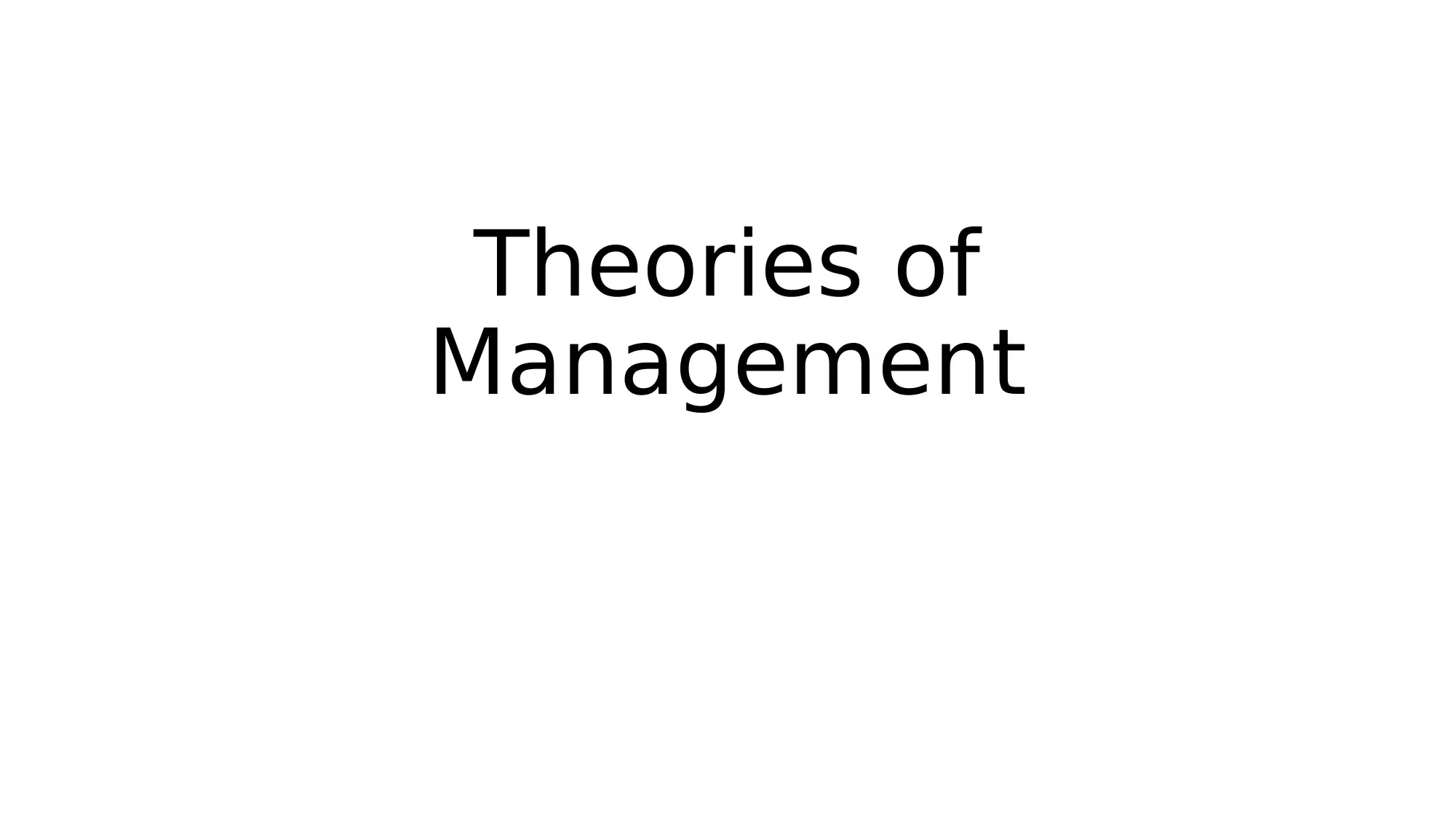
Theories of
Management
Management
Paraphrase This Document
Need a fresh take? Get an instant paraphrase of this document with our AI Paraphraser
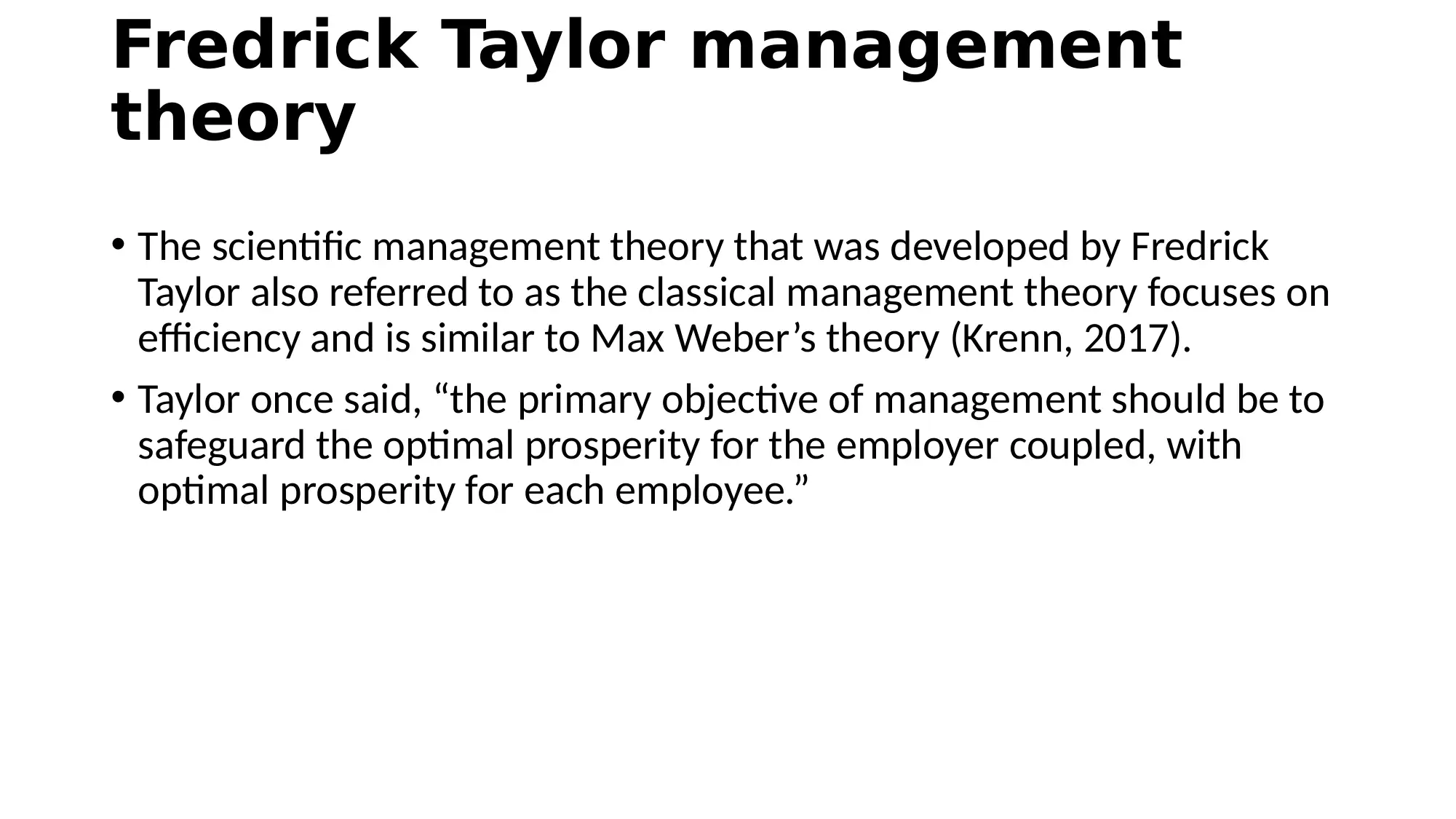
Fredrick Taylor management
theory
• The scientific management theory that was developed by Fredrick
Taylor also referred to as the classical management theory focuses on
efficiency and is similar to Max Weber’s theory (Krenn, 2017).
• Taylor once said, “the primary objective of management should be to
safeguard the optimal prosperity for the employer coupled, with
optimal prosperity for each employee.”
theory
• The scientific management theory that was developed by Fredrick
Taylor also referred to as the classical management theory focuses on
efficiency and is similar to Max Weber’s theory (Krenn, 2017).
• Taylor once said, “the primary objective of management should be to
safeguard the optimal prosperity for the employer coupled, with
optimal prosperity for each employee.”

Assignments are broken down into
subtasks
• As opposed to assigning the whole project to one individual and
allowing such an individual adequate time to complete the task,
managers divide the larger tasks into smaller tasks.
• The subtasks are aimed at making the process look more organized
and efficient as there are multiple workers working on one project
with each worker taking charge of their piece.
subtasks
• As opposed to assigning the whole project to one individual and
allowing such an individual adequate time to complete the task,
managers divide the larger tasks into smaller tasks.
• The subtasks are aimed at making the process look more organized
and efficient as there are multiple workers working on one project
with each worker taking charge of their piece.
⊘ This is a preview!⊘
Do you want full access?
Subscribe today to unlock all pages.

Trusted by 1+ million students worldwide
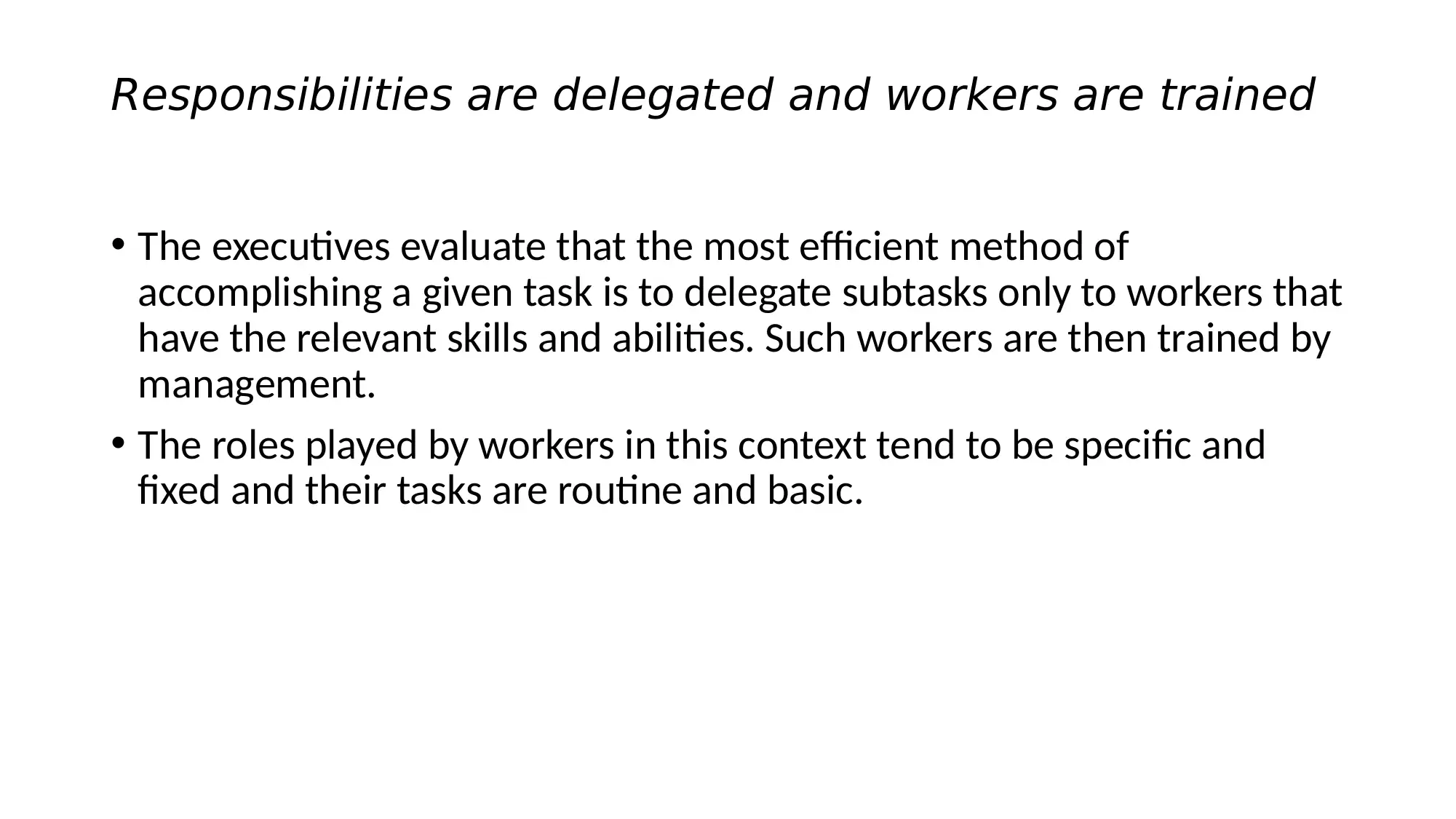
Responsibilities are delegated and workers are trained
• The executives evaluate that the most efficient method of
accomplishing a given task is to delegate subtasks only to workers that
have the relevant skills and abilities. Such workers are then trained by
management.
• The roles played by workers in this context tend to be specific and
fixed and their tasks are routine and basic.
• The executives evaluate that the most efficient method of
accomplishing a given task is to delegate subtasks only to workers that
have the relevant skills and abilities. Such workers are then trained by
management.
• The roles played by workers in this context tend to be specific and
fixed and their tasks are routine and basic.
Paraphrase This Document
Need a fresh take? Get an instant paraphrase of this document with our AI Paraphraser
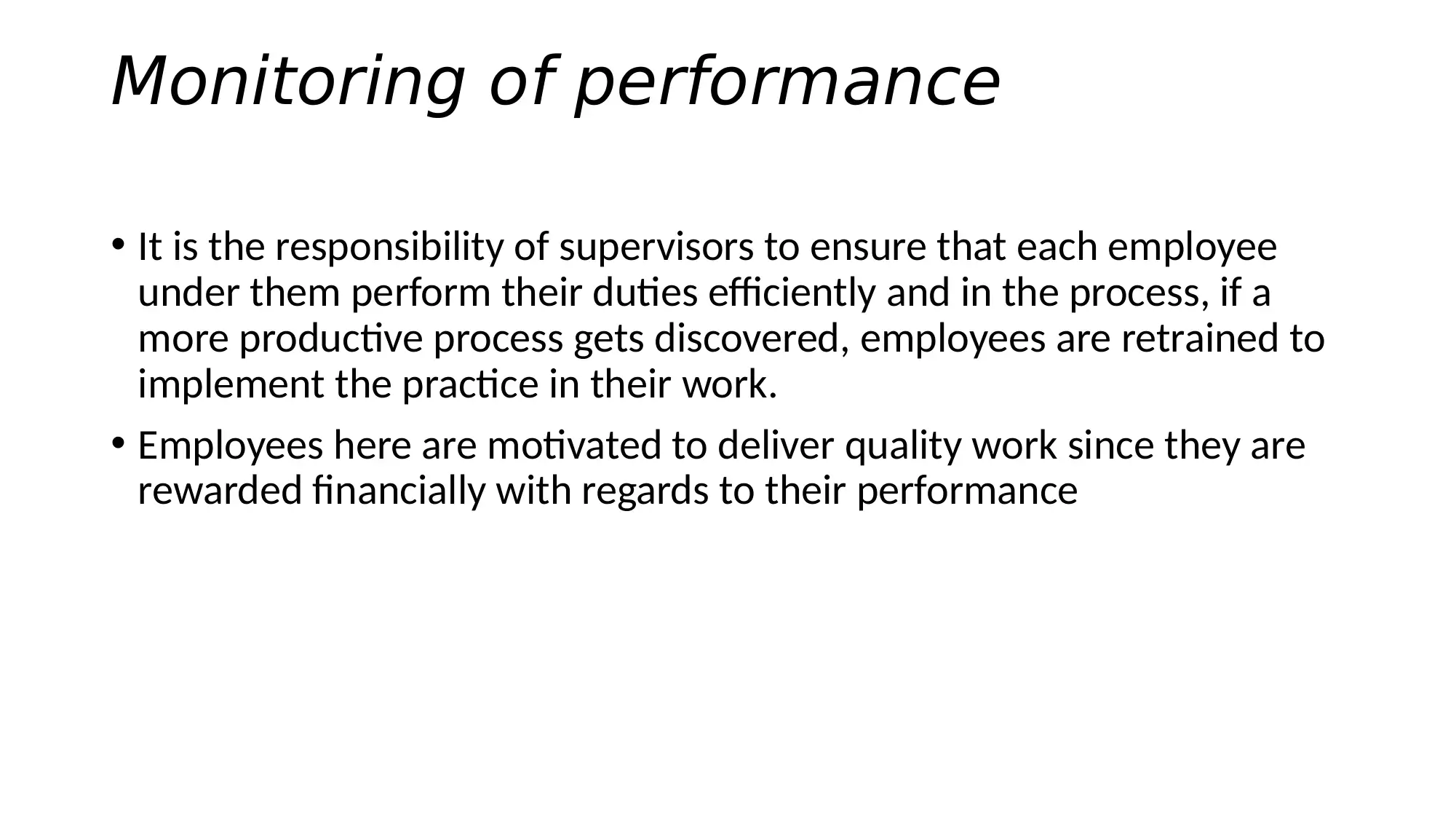
Monitoring of performance
• It is the responsibility of supervisors to ensure that each employee
under them perform their duties efficiently and in the process, if a
more productive process gets discovered, employees are retrained to
implement the practice in their work.
• Employees here are motivated to deliver quality work since they are
rewarded financially with regards to their performance
• It is the responsibility of supervisors to ensure that each employee
under them perform their duties efficiently and in the process, if a
more productive process gets discovered, employees are retrained to
implement the practice in their work.
• Employees here are motivated to deliver quality work since they are
rewarded financially with regards to their performance
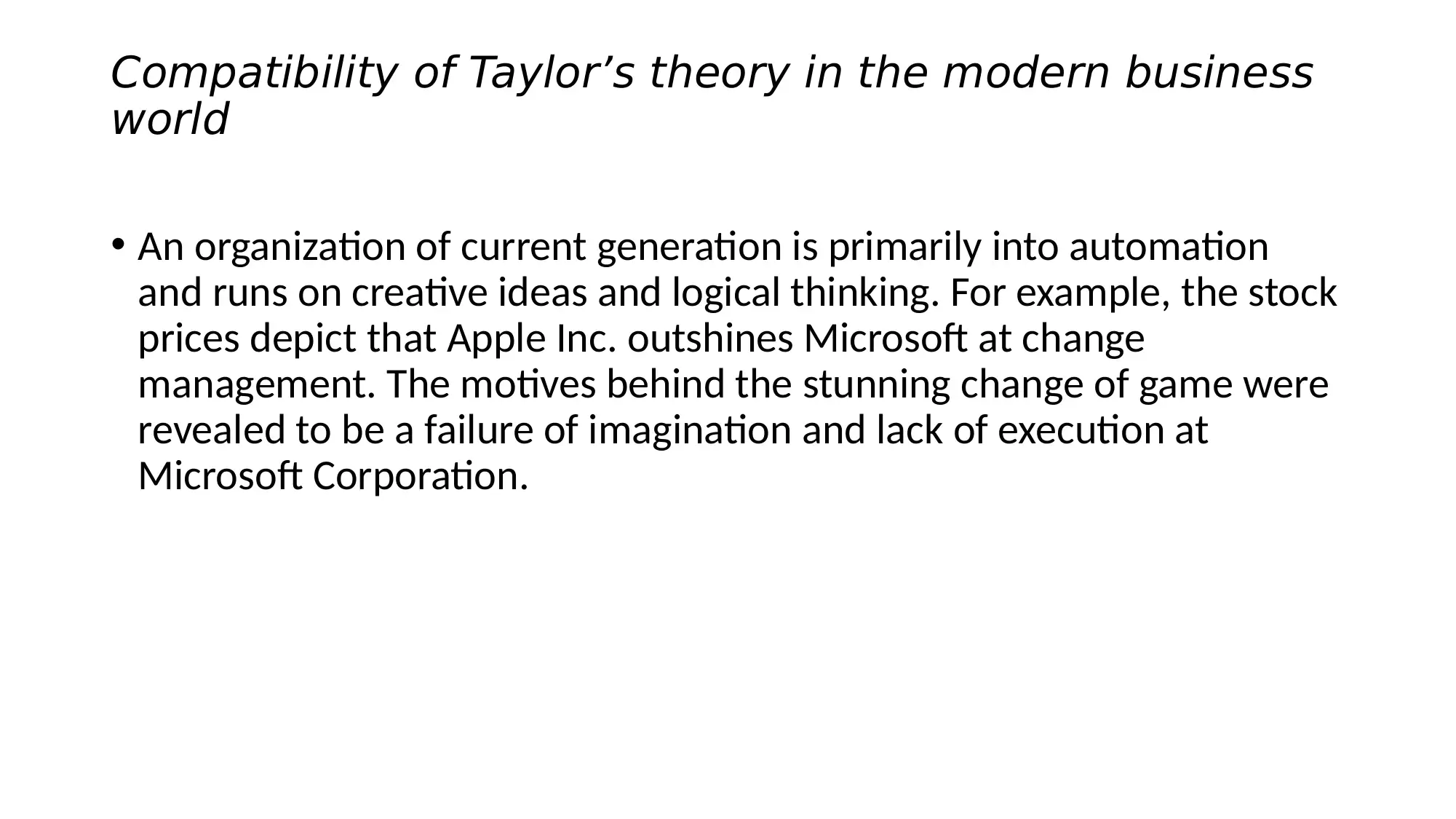
Compatibility of Taylor’s theory in the modern business
world
• An organization of current generation is primarily into automation
and runs on creative ideas and logical thinking. For example, the stock
prices depict that Apple Inc. outshines Microsoft at change
management. The motives behind the stunning change of game were
revealed to be a failure of imagination and lack of execution at
Microsoft Corporation.
world
• An organization of current generation is primarily into automation
and runs on creative ideas and logical thinking. For example, the stock
prices depict that Apple Inc. outshines Microsoft at change
management. The motives behind the stunning change of game were
revealed to be a failure of imagination and lack of execution at
Microsoft Corporation.
⊘ This is a preview!⊘
Do you want full access?
Subscribe today to unlock all pages.

Trusted by 1+ million students worldwide
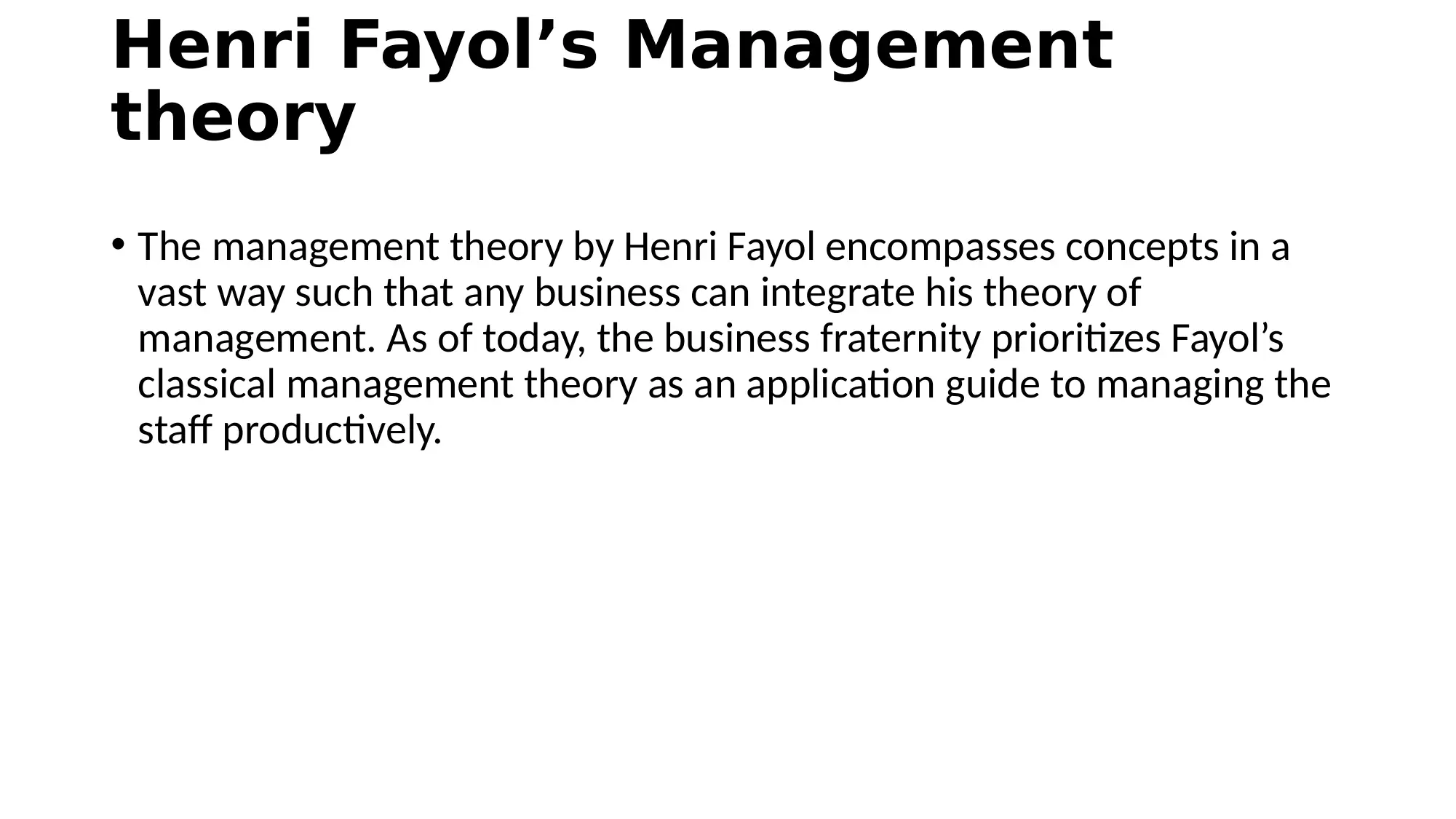
Henri Fayol’s Management
theory
• The management theory by Henri Fayol encompasses concepts in a
vast way such that any business can integrate his theory of
management. As of today, the business fraternity prioritizes Fayol’s
classical management theory as an application guide to managing the
staff productively.
theory
• The management theory by Henri Fayol encompasses concepts in a
vast way such that any business can integrate his theory of
management. As of today, the business fraternity prioritizes Fayol’s
classical management theory as an application guide to managing the
staff productively.
Paraphrase This Document
Need a fresh take? Get an instant paraphrase of this document with our AI Paraphraser
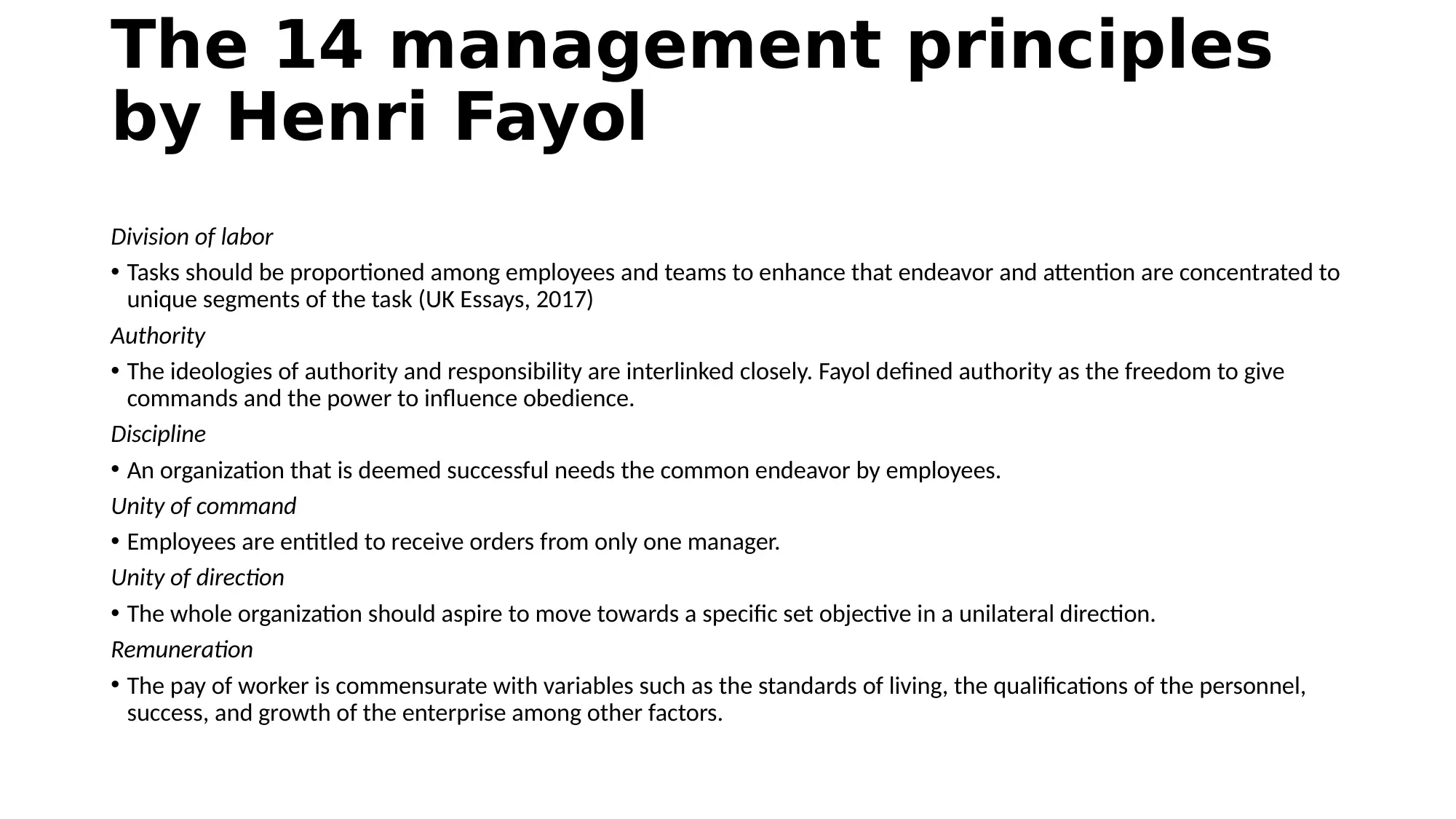
The 14 management principles
by Henri Fayol
Division of labor
• Tasks should be proportioned among employees and teams to enhance that endeavor and attention are concentrated to
unique segments of the task (UK Essays, 2017)
Authority
• The ideologies of authority and responsibility are interlinked closely. Fayol defined authority as the freedom to give
commands and the power to influence obedience.
Discipline
• An organization that is deemed successful needs the common endeavor by employees.
Unity of command
• Employees are entitled to receive orders from only one manager.
Unity of direction
• The whole organization should aspire to move towards a specific set objective in a unilateral direction.
Remuneration
• The pay of worker is commensurate with variables such as the standards of living, the qualifications of the personnel,
success, and growth of the enterprise among other factors.
by Henri Fayol
Division of labor
• Tasks should be proportioned among employees and teams to enhance that endeavor and attention are concentrated to
unique segments of the task (UK Essays, 2017)
Authority
• The ideologies of authority and responsibility are interlinked closely. Fayol defined authority as the freedom to give
commands and the power to influence obedience.
Discipline
• An organization that is deemed successful needs the common endeavor by employees.
Unity of command
• Employees are entitled to receive orders from only one manager.
Unity of direction
• The whole organization should aspire to move towards a specific set objective in a unilateral direction.
Remuneration
• The pay of worker is commensurate with variables such as the standards of living, the qualifications of the personnel,
success, and growth of the enterprise among other factors.
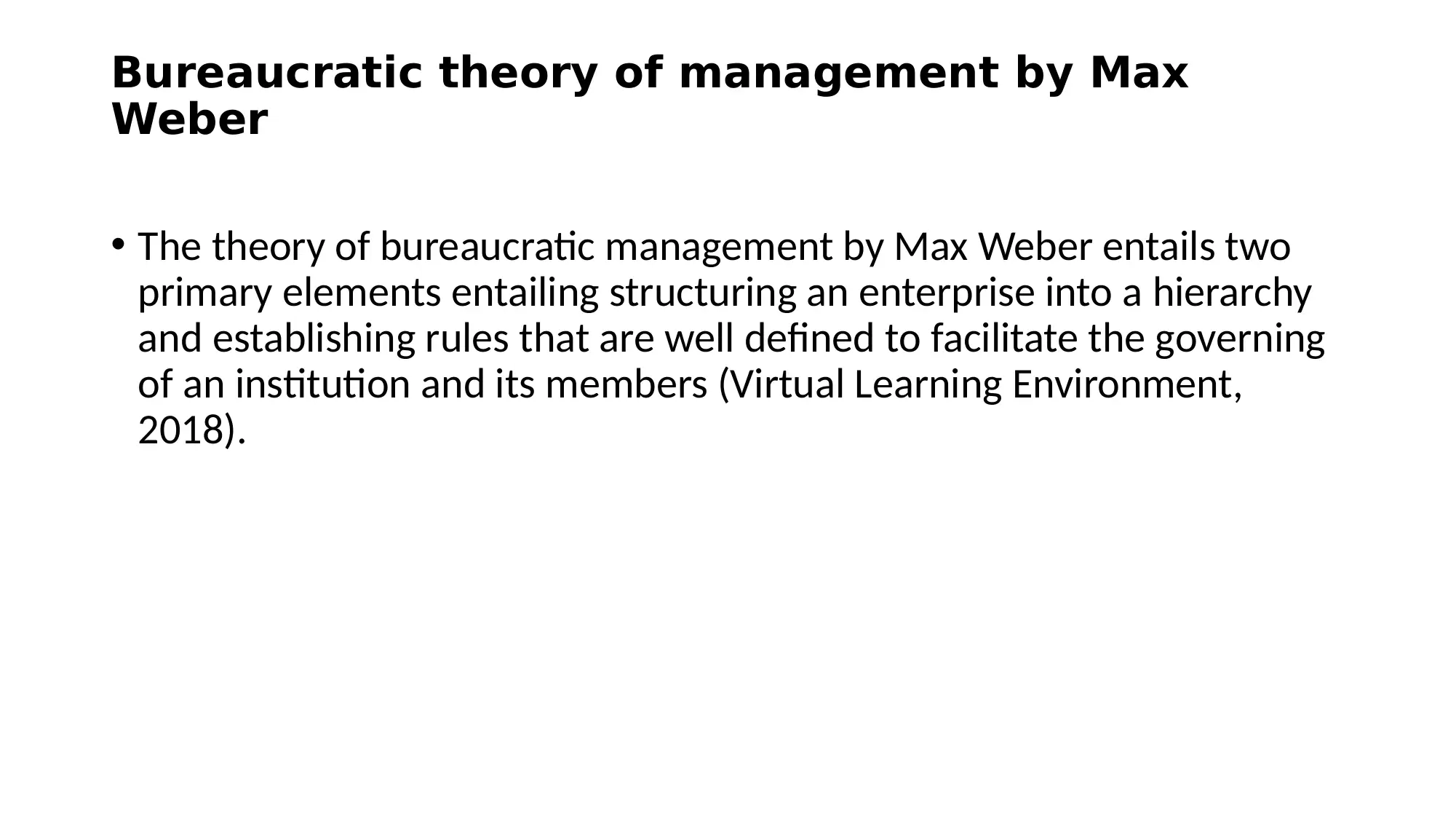
Bureaucratic theory of management by Max
Weber
• The theory of bureaucratic management by Max Weber entails two
primary elements entailing structuring an enterprise into a hierarchy
and establishing rules that are well defined to facilitate the governing
of an institution and its members (Virtual Learning Environment,
2018).
Weber
• The theory of bureaucratic management by Max Weber entails two
primary elements entailing structuring an enterprise into a hierarchy
and establishing rules that are well defined to facilitate the governing
of an institution and its members (Virtual Learning Environment,
2018).
⊘ This is a preview!⊘
Do you want full access?
Subscribe today to unlock all pages.

Trusted by 1+ million students worldwide
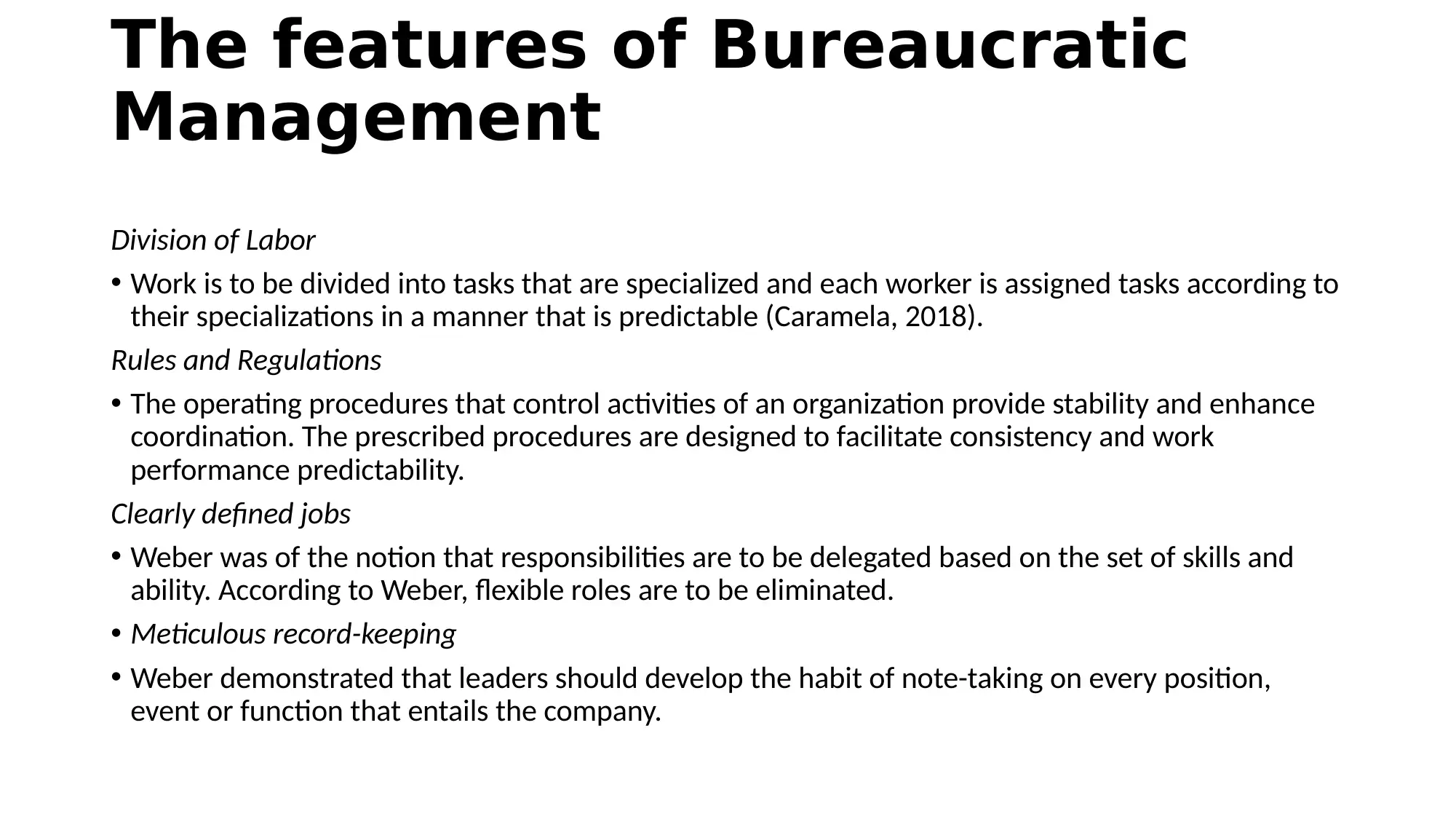
The features of Bureaucratic
Management
Division of Labor
• Work is to be divided into tasks that are specialized and each worker is assigned tasks according to
their specializations in a manner that is predictable (Caramela, 2018).
Rules and Regulations
• The operating procedures that control activities of an organization provide stability and enhance
coordination. The prescribed procedures are designed to facilitate consistency and work
performance predictability.
Clearly defined jobs
• Weber was of the notion that responsibilities are to be delegated based on the set of skills and
ability. According to Weber, flexible roles are to be eliminated.
• Meticulous record-keeping
• Weber demonstrated that leaders should develop the habit of note-taking on every position,
event or function that entails the company.
Management
Division of Labor
• Work is to be divided into tasks that are specialized and each worker is assigned tasks according to
their specializations in a manner that is predictable (Caramela, 2018).
Rules and Regulations
• The operating procedures that control activities of an organization provide stability and enhance
coordination. The prescribed procedures are designed to facilitate consistency and work
performance predictability.
Clearly defined jobs
• Weber was of the notion that responsibilities are to be delegated based on the set of skills and
ability. According to Weber, flexible roles are to be eliminated.
• Meticulous record-keeping
• Weber demonstrated that leaders should develop the habit of note-taking on every position,
event or function that entails the company.
1 out of 10
Related Documents
Your All-in-One AI-Powered Toolkit for Academic Success.
+13062052269
info@desklib.com
Available 24*7 on WhatsApp / Email
![[object Object]](/_next/static/media/star-bottom.7253800d.svg)
Unlock your academic potential
Copyright © 2020–2026 A2Z Services. All Rights Reserved. Developed and managed by ZUCOL.





